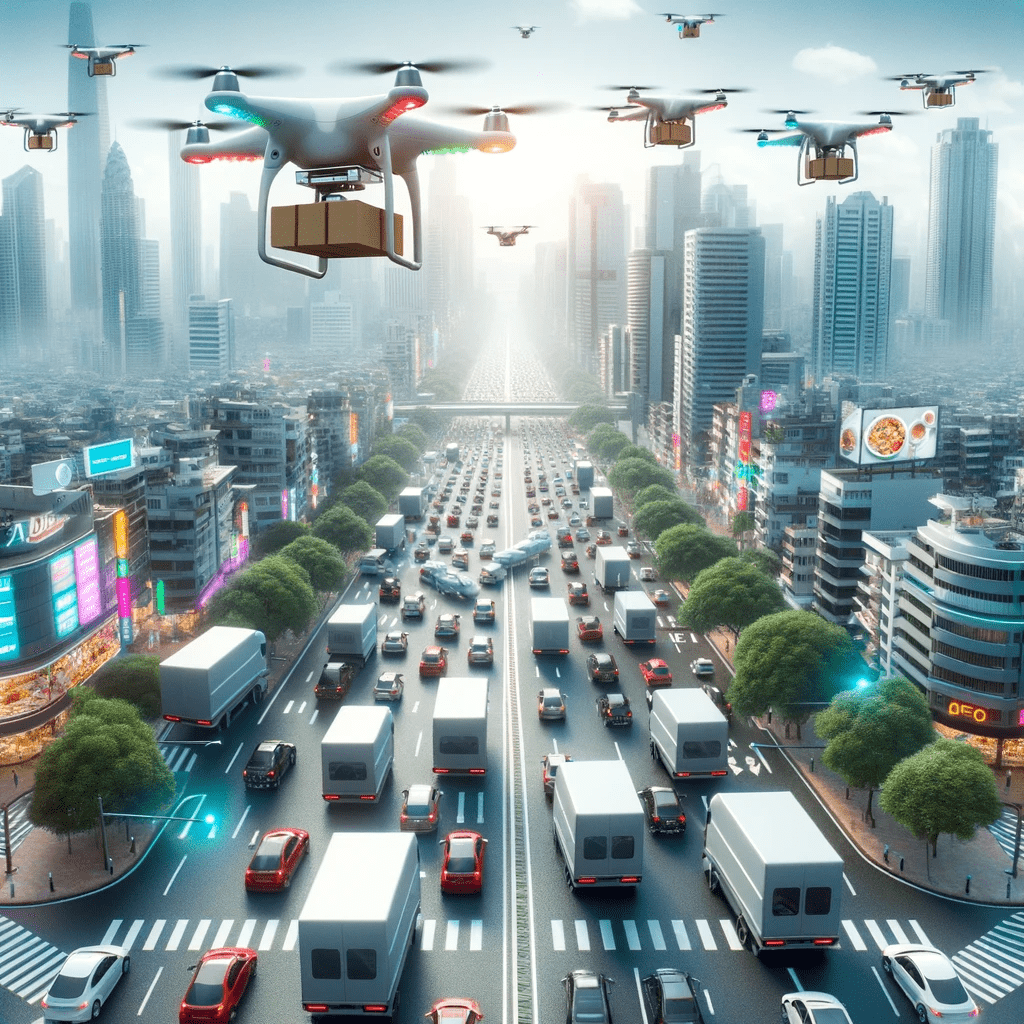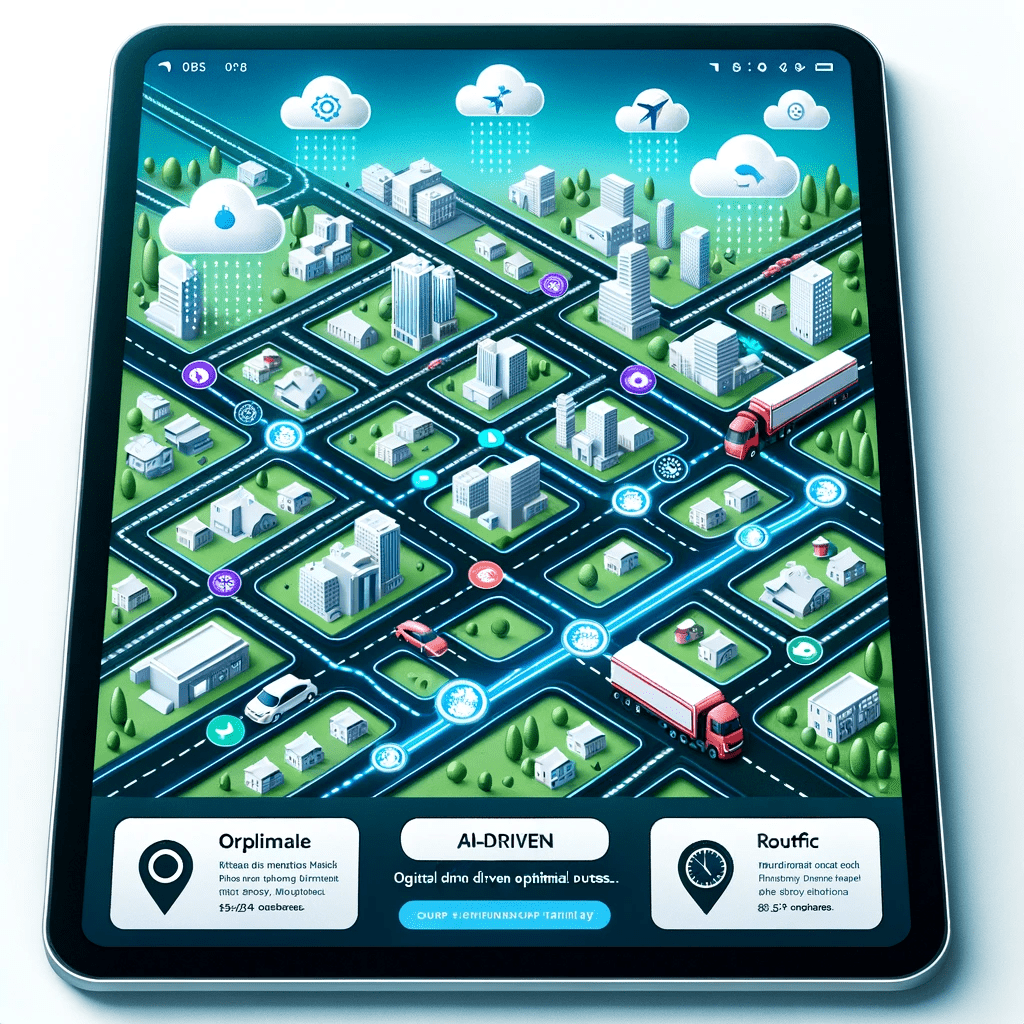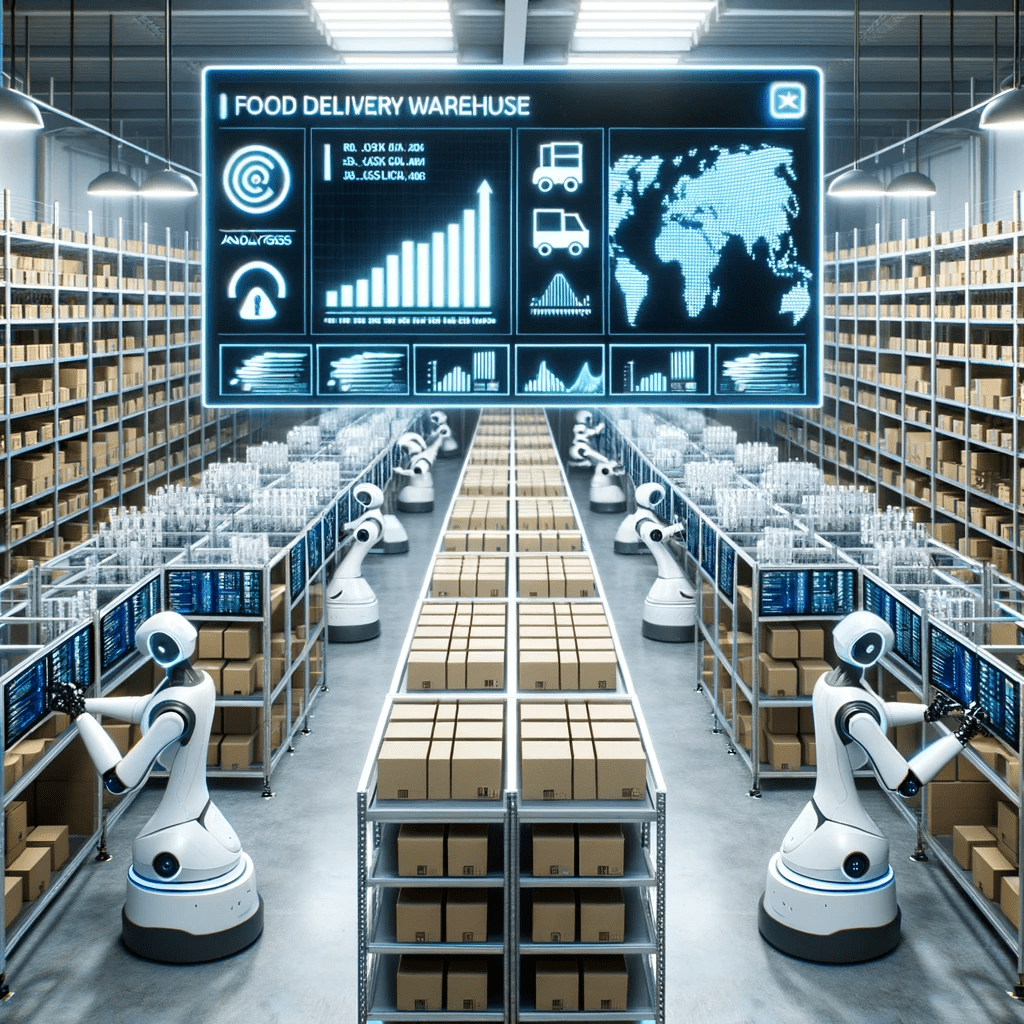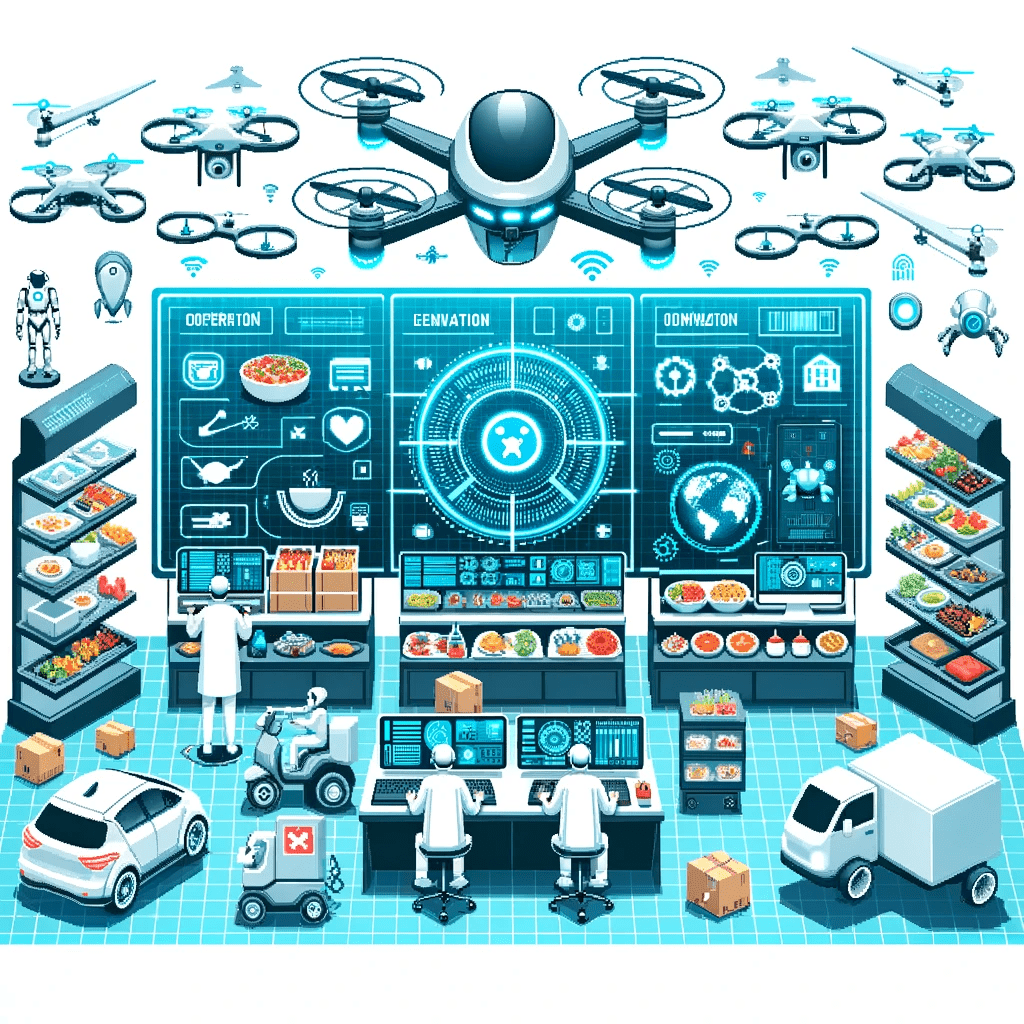The online food delivery market has experienced significant growth and competitiveness in recent years. With the rise of technology, artificial intelligence (AI) has played a crucial role in transforming food delivery logistics, improving efficiency, and enhancing customer experience. AI has revolutionized how food delivery operations are streamlined and has provided numerous benefits for businesses and customers.
The growth of the online food delivery market has been remarkable. According to research, the market is projected to exceed $474.30 billion by 2026, with an annual growth rate of 8.38%. This growth is driven by increased reliance on food delivery apps and changing consumer preferences. As the market becomes more competitive, businesses turn to AI to gain a competitive edge and meet customer demands.

Benefits of AI in Food Delivery Logistics
Streamlining Operations and Improving Efficiency
One of the key benefits of AI in food delivery logistics is the ability to streamline operations and improve efficiency. AI technology enables instant doorstep deliveries by processing multiple orders simultaneously. For example, delivery platforms can leverage AI algorithms to efficiently manage large orders, ensuring that customers receive their meals promptly. This enhances customer satisfaction and helps businesses optimize their operations and reduce costs.
Another aspect where AI significantly contributes to efficiency is delivery route optimization. AI algorithms analyze various factors such as traffic patterns, delivery locations, and order volumes to determine the most efficient routes for delivery drivers. Businesses can reduce delivery times and improve order accuracy by optimizing delivery routes. For instance, food delivery platforms can utilize AI algorithms to ensure drivers take the most efficient routes to avoid delays and provide a seamless customer experience.
AI integration in delivery apps also helps distribute staff efficiently and eliminates human error. Businesses can ensure that delivery personnel are allocated optimally to meet customers' demands by automating certain tasks, such as order assignments and dispatching. This improves operational efficiency and minimizes errors that may occur due to manual processes. For example, AI algorithms can intelligently assign drivers based on factors such as proximity to the restaurant, order volume, and driver availability.
Enhancing Customer Experience
AI has significantly enhanced the customer experience in the food delivery industry. One of the ways AI accomplishes this is through AI-powered recommendations. According to a study, 58% of consumers have received AI-powered recommendations from food delivery services. AI algorithms analyze customer preferences, order history, and other data to provide customized food recommendations. This personalized approach leads to better sales and customer retention, as customers are more likely to order again when they receive recommendations tailored to their tastes.
Chatbot integration is another way AI enhances the customer experience. Chatbots provide real-time assistance with food ordering, answering customer queries, and resolving issues promptly. Customers can interact with chatbots through messaging platforms or voice assistants, receiving instant responses to their questions or concerns. This improves customer support, enhances the ordering experience, and ensures customers interact seamlessly with the food delivery platform. For example, food delivery services like Uber Eats and DoorDash have implemented chatbots to personalize customer recommendations and streamline the ordering experience.
Generative AI is an emerging technology that offers highly personalized services in the food delivery industry. Generative AI can generate personalized meal plans, tailored promotions, and customized recommendations by analyzing large datasets and identifying patterns. This level of personalization creates a unique experience for each customer, increasing customer satisfaction and loyalty. For instance, generative AI can analyze customer data to identify dietary preferences, allergies, and other factors to provide highly tailored menu choices and promotions.

AI in Restaurant Operations
Streamlining Food Service
AI automation has revolutionized food service operations in restaurants. One area where AI has made a significant impact is drive-thru operations. AI-powered drive-thru systems can predict customer orders based on historical data, weather conditions, and other factors. This enables restaurants to prepare orders in advance, leading to faster service times and improved customer satisfaction. For example, fast-food chains like McDonald's have implemented AI-powered drive-thru systems to streamline ordering and reduce wait times.
Voice-enabled AI technology is another aspect of AI integration in restaurants. This technology allows customers to interact with AI-powered voice assistants to place orders or get recommendations. Voice assistants can analyze customer preferences and provide personalized suggestions, leading to increased sales and improved customer experience. For instance, some restaurants have implemented voice-enabled AI systems that suggest additional menu items based on customer preferences, creating upselling opportunities.
Besides improving efficiency, AI automation in food service operations allows restaurants to redeploy their workers to focus on higher-value guest experiences. By automating certain tasks, such as order taking and payment processing, restaurants can free up their staff to provide better customer service and engage with guests on a more personal level. This improves overall guest satisfaction and creates a more enjoyable dining experience. For example, some restaurants have assigned staff members to greet and interact with guests, ensuring their dining experience is memorable and personalized.
Improving Food Preparation and Customer Interactions
AI technology is transforming food preparation and customer interactions in restaurants. By implementing AI algorithms, restaurants can improve the accuracy of their orders and reduce errors. AI systems can analyze ingredients, cooking methods, and customer preferences to ensure that each order is prepared correctly. This enhances the dining experience and reduces food waste by minimizing errors in the preparation process. For example, AI-powered systems can provide real-time feedback to chefs, ensuring that each dish meets the desired standards.
In addition to improving food preparation, AI technology enhances restaurant customer interactions. AI-powered systems can analyze customer data, such as order history and preferences, to provide personalized recommendations and suggestions. This level of personalization creates a unique and tailored experience for each customer, increasing customer satisfaction and loyalty. For instance, some restaurants have implemented AI-powered systems that provide personalized menu choices and promotions based on individual customer preferences.

Challenges and Considerations in AI Integration
Hiring AI Development Experts
Successful integration of AI in food delivery logistics and restaurant operations requires hiring experts familiar with AI development and machine learning. These experts can design and implement AI systems that cater specifically to the needs of the business. However, finding and hiring AI development experts can be a challenge. Businesses must have the right expertise and knowledge to implement AI solutions effectively. Budget, expected project delivery, and application complexity should be considered when deciding between in-house or third-party development teams.
To overcome these challenges, businesses can consider several factors. When hiring in-house AI development teams, looking for developers with experience in building similar products is important. This ensures they have the necessary skills and knowledge to effectively design and implement AI solutions. However, in-house teams can be costly and require significant infrastructure and training investment. On the other hand, third-party development teams can provide specialized expertise and cost-effective solutions. Offshore developers, for example, can offer cost-effective options without compromising on quality. When choosing a third-party team, transparent communication and feedback from previous clients should also be considered.
Overcoming Resistance and Franchisee Adoption
Adopting AI in large restaurant chains often faces resistance, especially from franchisees. Resistance to change and fear of job displacement can hinder the integration of AI in some cases. However, it is crucial to showcase the benefits of AI to franchisees and address their concerns. By demonstrating how AI can improve efficiency, enhance the customer experience, and create new opportunities, businesses can encourage franchisees to embrace these technological advancements.
Communication and education are key when overcoming resistance and promoting franchisee adoption. Providing training and support to franchisees can help them understand the benefits and potential of AI in their operations. This includes showcasing case studies and success stories from other franchisees who have successfully implemented AI solutions. Creating a sense of collaboration and involving franchisees in the decision-making process can also help gain buy-in and ensure the smooth adoption of AI technology.
Future Prospects of AI in Food Delivery Logistics
The prospects of AI in food delivery logistics are promising. As technology advances, AI will play a pivotal role in meeting customers' evolving demands and transforming the online food delivery industry. Highly personalized services, tailored promotions, and integration with virtual assistants and smart home devices are among the exciting prospects.
Generative AI, in particular, holds great potential for the food delivery industry. Generative AI can optimize delivery routes, predict behavior patterns, and personalize the customer experience by analyzing large datasets and identifying patterns. For example, AI algorithms can analyze customer data to generate personalized recommendations, tailored promotions, and customized meal plans. This level of personalization creates a unique experience for each customer, increasing customer satisfaction and loyalty.
Moreover, integrating AI with virtual assistants and smart home devices can further enhance the food delivery experience. Virtual assistants can assist customers with placing orders, providing real-time updates on delivery status, and answering queries. Smart home devices can be integrated with AI systems for seamless ordering and delivery experiences. For instance, customers can use voice commands to place orders, receive recommendations, and track the progress of their deliveries.

Conclusion
In conclusion, AI has brought numerous benefits to the online food delivery industry. AI has revolutionized how food is delivered and consumed by streamlining operations, improving efficiency, and enhancing the customer experience. The growth and competitiveness of the online food delivery market have driven businesses to turn to AI to gain a competitive edge and meet evolving customer demands.
The integration of AI in food delivery logistics has enabled businesses to achieve instant doorstep deliveries, optimize delivery routes, and distribute staff efficiently. This has reduced delivery times, improved order accuracy, and enhanced operational efficiency. Furthermore, AI-powered recommendations, chatbot integration, and generative AI have enhanced the customer experience by providing personalized services, real-time assistance, and tailored promotions.
While the integration of AI brings significant benefits, there are challenges to overcome, such as hiring AI development experts and ensuring franchisee adoption. Businesses can make informed decisions regarding in-house or third-party development teams by considering factors such as budget, project complexity, and expertise. Overcoming resistance and promoting franchisee adoption requires effective communication, education, and collaboration.
Looking ahead, the prospects of AI in food delivery logistics are promising. Highly personalized services, tailored promotions, and integration with virtual assistants and smart home devices are set to transform the industry. As technology advances, AI will play a vital role in meeting customers' evolving needs and driving innovation in the online food delivery market.